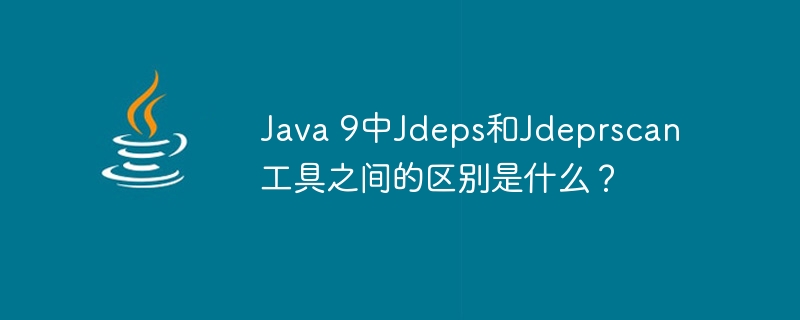ホームページ >Java >&#&チュートリアル >Java 9 の Jdeps ツールと Jdeprscan ツールの違いは何ですか?
Java 9 の Jdeps ツールと Jdeprscan ツールの違いは何ですか?
- WBOYWBOYWBOYWBOYWBOYWBOYWBOYWBOYWBOYWBOYWBOYWBOYWB転載
- 2023-09-16 15:21:031374ブラウズ

Jdeps ツールは、クラスの依存関係 を分析するために使用できます。 「jdeps -jdkinternals jararchive.jar」コマンドを実行すると、Java 内部 API を使用するすべてのクラスのリストが出力されます。 Jdeps ツールは依存関係の詳細な説明を返しますが、Jdeprscan は別の便利なツールであり、特に「-for-removal」フラグと組み合わせると便利です。このツールは、特定の jar アーカイブに対する 非推奨の API の使用をすべて表示します。表示できるのは jdk メソッドの非推奨の使用のみであり、 サードパーティの jar はこのツールを使用してチェックできません。 ##Jdeps ツール:
# 「
jdeps- 」は、パッケージ レベルとクラス レベルの依存関係の両方で使用できるクラス依存関係分析ツールです。
- 「jdeps class_file 」コマンドは、指定されたクラス ファイルのパッケージ レベルの依存関係を出力します。
- "jdeps" -verbose " コマンドはクラス レベルの依存関係を出力します。
- "jdeps jar_file " コマンドはパッケージ レベルの依存関係を出力します
- 「jdeps --inverse --require module_name 」コマンドは、指定された Java モジュールのパッケージ レベルの逆依存関係を出力します。
- 以下では、「jdeps --help」コマンドを使用して、オプションの完全なリストを表示できます。
<strong>C:\Users\user>jdeps --help
Usage: jdeps <options> <path ...>]
<path> can be a pathname to a .class file, a directory, a JAR file.
Possible options include:
-dotoutput <dir>
--dot-output <dir> Destination directory for DOT file output
-s -summary Print dependency summary only.
-v -verbose Print all class level dependences
Equivalent to -verbose:class -filter:none.
-verbose:package Print package-level dependences excluding
dependences within the same package by default
-verbose:class Print class-level dependences excluding
dependences within the same package by default
-apionly
--api-only Restrict analysis to APIs i.e. dependences
from the signature of public and protected
members of public classes including field
type, method parameter types, returned type,
checked exception types etc.
-jdkinternals
--jdk-internals Finds class-level dependences on JDK internal
APIs. By default, it analyzes all classes
on --class-path and input files unless -include
option is specified. This option cannot be
used with -p, -e and -s options.
WARNING: JDK internal APIs are inaccessible.
--check <module-name>[,<module-name>...
Analyze the dependence of the specified modules
It prints the module descriptor, the resulting
module dependences after analysis and the
graph after transition reduction. It also
identifies any unused qualified exports.
--generate-module-info <dir>
Generate module-info.java under the specified
directory. The specified JAR files will be
analyzed. This option cannot be used with
--dot-output or --class-path. Use
--generate-open-module option for open modules.
--generate-open-module <dir>
Generate module-info.java for the specified
JAR files under the specified directory as
open modules. This option cannot be used with
--dot-output or --class-path.
--list-deps Lists the dependences and use of JDK internal APIs.
--list-reduced-deps Same as --list-deps with not listing
the implied reads edges from the module graph
If module M1 depends on M2 and M3,
M2 requires public on M3, then M1 reading M3 is
implied and removed from the module graph.
-cp <path>
-classpath <path>
--class-path <path> Specify where to find class files
--module-path <module path>
Specify module path
--upgrade-module-path <module path>
Specify upgrade module path
--system <java-home> Specify an alternate system module path
--add-modules <module-name>[,<module-name>...]
Adds modules to the root set for analysis
-m <module-name>
--module <module-name> Specify the root module for analysis
--multi-release <version>
Specifies the version when processing
multi-release jar files. should
be integer >= 9 or base.
Options to filter dependences:
-p <pkg>
-package <pkg>
--package <pkg> Finds dependences matching the given package
name (may be given multiple times).
-e <regex>
-regex <regex>
--regex <regex> Finds dependences matching the given pattern.
--require <module-name> Finds dependences matching the given module
name (may be given multiple times). --package,
--regex, --require are mutual exclusive.
-f <regex> -filter <regex> Filter dependences matching the given
pattern. If given multiple times, the last
one will be used.
-filter:package Filter dependences within the same package.
This is the default.
-filter:archive Filter dependences within the same archive.
-filter:module Filter dependences within the same module.
-filter:none No -filter:package and -filter:archive
filtering. Filtering specified via the
-filter option still applies.
Options to filter classes to be analyzed:
-include <regex> Restrict analysis to classes matching pattern
This option filters the list of classes to
be analyzed. It can be used together with
-p and -e which apply pattern to the dependences
-P -profile Show profile containing a package
-R -recursive Recursively traverse all run-time dependences.
The -R option implies -filter:none. If -p,
-e, -f option is specified, only the matching
dependences are analyzed.
-I --inverse Analyzes the dependences per other given options
and then find all artifacts that directly
and indirectly depend on the matching nodes.
This is equivalent to the inverse of
compile-time view analysis and print
dependency summary. This option must use
with --require, --package or --regex option.
--compile-time Compile-time view of transitive dependences
i.e. compile-time view of -R option.
Analyzes the dependences per other given options
If a dependence is found from a directory,
a JAR file or a module, all c*lasses in that
containing archive are analyzed.
-q - quiet Do not show missing dependences from
--generate-module-info output.
-version --version Version information</strong>jdeprscan ツール: "
jdeprscan" は、非推奨の API 要素をスキャンするために使用できる Java の非推奨の API スキャナー ツールです。
- 「
- jdeprscan class_file」コマンドは、次の非推奨の API をスキャンします。指定された jJava クラス ファイル。 li>「
- jdeprscan jar_file」コマンドは、指定された jar ファイルをスキャンして非推奨の API を探します。 「
- jdeprscan --release X#」 ##" コマンドは、特定の JDK バージョンの非推奨 API をスキャンします。" jdeprscan --list --release X
- " コマンドは、特定の JDK バージョンのすべての非推奨 API をリストします。 以下では、「
- jdeprscan --help 」コマンドを使用して、オプションの完全なリストを表示できます。
以上がJava 9 の Jdeps ツールと Jdeprscan ツールの違いは何ですか?の詳細内容です。詳細については、PHP 中国語 Web サイトの他の関連記事を参照してください。
声明:
この記事はtutorialspoint.comで複製されています。侵害がある場合は、admin@php.cn までご連絡ください。

